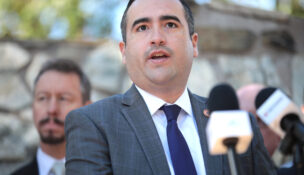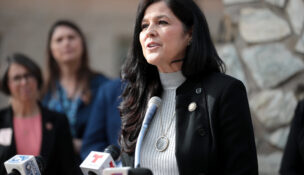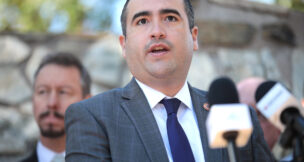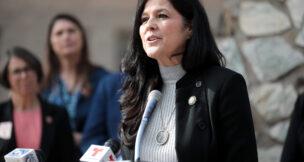Mayes had detailed report from private group on how to prosecute ‘fake electors’
Howard Fischer, Capitol Media Services//December 27, 2024//
Mayes had detailed report from private group on how to prosecute ‘fake electors’
Howard Fischer, Capitol Media Services//December 27, 2024//
An organization that bills itself as nonpartisan but has worked on Democratic issues prepared a 47-page report for Attorney General Kris Mayes on how to prosecute the “fake electors” ahead of the indictments her office obtained against them.
A document obtained by Capitol Media Services shows that in July 2023 States United Democracy Center provided not just a detailed timeline of the events leading up to 11 Arizona Republicans submitting a false statement to Congress that they were the true electors pledged to Donald Trump in the 2020 presidential race despite the contest being won by Joe Biden, but also a list of charges that the organization said could be brought against them and others involved in the scheme.
Richie Taylor, spokesman for Mayes, would not say whether that report was specifically prepared at her request.
But Dan Barr, Mayes’ chief deputy, had signed a separate letter of engagement with States United just two months earlier to have the organization advise the Attorney General’s Office on “legal strategies to secure the integrity and security of elections.”
Taylor, however, said the work States United did on the entire fake elector scheme was “separate from the independent investigation” the Attorney General’s Office did.
“They prepared this memo … really before our case had even ramped up,” he told Capitol Media Services.
“It was publicly compiled information,” Taylor said, relying on everything from news reports and information from the January 6th Committee in Congress to lawsuits filed by those seeking to overturn the 2020 election. “But it did not have a significant, if much, impact at all on the case.”
But there was more involved than historical narrative.
States United specifically spelled out exactly which Arizona laws could be used to prosecute those involved and made recommendations. And it even detailed why it would still be legally OK to indict people years later for events that had occurred in 2020.
Taylor declined to say what information his office was seeking from States United when the contract was signed on May 15, 2023.
“I’m not going to get into the inner workings of the relationship,” he said.
All this comes as the state continues to prepare for a January 2026 trial on the remaining defendants in the case: 10 of the 11 electors themselves and a host of others linked to the 2020 Trump reelection campaign. They each face nine separate felonies including fraud and conspiracy. Mayes has said the case will continue despite voters returning Trump to the White House in this year’s election.
Lorraine Pellegrino, secretary of the electors group and a past president of the Ahwatukee Republican Women, agreed to plead guilty earlier this year to a single count of filing a false instrument. She was placed on unsupervised probation.
Jenna Ellis, who had been an attorney for Trump’s 2020 campaign, technically remains in the case. But signed a “cooperation agreement” earlier this year with the Attorney General’s Office, agreeing to testify in court in exchange for the charges against her eventually being dropped.
The 47-page report originally was marked as protected by “attorney-client privilege,” with Mayes’ office being the client even though States United had agreed to do the research for free. But it had to be turned over to the attorneys for the defendants as part of discovery and disclosure requirements in criminal cases.
It contains a detailed list of events following the 2020 election where Democrat Joe Biden outpolled Trump in Arizona by 10,457 votes, winning the state’s 11 electors.
That includes pressure by Trump attorney Rudy Giuliani and others on then-House Speaker Rusty Bowers, a Mesa Republican, to replace the elected electors with an alternate slate of Trump electors. He refused.
A lawsuit filed by state GOP Chair Kelli Ward and others to decertify the results was rejected by U.S. District Court Judge Diane Humetewa who said their claims fell short “in their particularity and plausibility.”
That then led to the plan with Trump associates working with local Republicans, led by Ward, to prepare and sign certificates saying that 11 Republicans, including Ward, were actually the legitimate electors from Arizona.
At least part of the reason for that was to throw the Jan. 6, 2021, count of votes by Congress into disarray, providing an opportunity for then Vice President Mike Pence to refuse the contested electoral votes, leaving Biden short of what he needed to win. That fell apart when Pence would not go along.
Among those involved – and ultimately indicted – other than the 11 fake electors were other Trump associates, including Giuliani and Mark Meadows who was Trump’s chief of staff.
Trump himself was listed as an “unindicted co-conspirator,” with the Attorney General’s Office later disclosing its lawyers actually asked the grand jury not to indict him.
In the memo to the Attorney General’s Office, States United listed six specific state statutes they said were violated: forgery, tampering with a public record, criminal impersonation, presenting a false instrument for filing, fraudulent schemes and artifices, and conspiracy. It also went into great detail on why each applies in this case.
The final indictment by Mayes used three of those – forgery, fraudulent schemes and artifices, and conspiracy – and added a lower-level felony of fraudulent schemes and practices.
States United also went on to describe potential defenses that those indicted could claim, including that they had no “unlawful intent” but were relying on the advice of counsel. But the attorneys at the organization said to do that, they would have to waive their attorney-client privilege which could expose other communications they had with their lawyers, both to the public and to prosecutors.
And the memo went into detail on why Mayes’ office could indict those involved even though the events dated back to late 2020. It said that, in general, the statute of limitations for these crimes is seven years.
It also sought to give Mayes some cover if questions were raised about why she would be seeking indictments years after the event.
“Thorough investigations of complex cases take time,” the memo said. And there was something else: the fact that Mayes herself wasn’t elected until 2022 and took office in early 2023.
Her predecessor, Mark Brnovich, had not been among the 2020 election deniers. And he even prepared a summary of investigative findings in March 2022 that found no evidence of claims of fraud spread by Trump and his allies.
But Brnovich at the time was involved in a high-profile Republican primary race for Senate where support from the former president was considered a factor. Trump eventually endorsed Blake Masters, who was a supporter of Trump’s claims of election fraud; Masters won the primary but lost the general election to Democrat Mark Kelly.
And that memo was not made public until after Mayes took office.
As to the issue of fake electors, Brnovich did not pursue it, saying in 2022 that was being handled by the U.S. Department of Justice. All that, the States United memo says, gives Mayes the ability to pursue charges years later.
“Under these facts, the investigation has been diligent, without undue delay,” the memo states. “In short, neither legal or prudential considerations would make a prosecution improper.”
There is precedent for the Attorney General’s Office to seek outside legal help – including from partisan sources.
A decade ago, Republican Tom Horne sought help from the Scottsdale-based Alliance Defending Freedom in two cases where individuals were challenging the state’s ban on same-sex marriage. Lawyers from ADF, which defines itself as a “Christian legal group,” even were appointed special assistant attorneys general, with the state paying no portion of their fees or travel.
The following year, Brnovich, now the attorney general, signed an agreement with ADF to defend the state, without cost, in a lawsuit filed by Planned Parenthood Arizona over abortion restrictions.
States United bills itself as a nonpartisan organization that provides free legal and research help to state and local elected officials.
But its involvement in Arizona has had partisan tinges.
It conducted a 2021 poll to show that Arizonans did not support what it called a “sham election review” of the 2020 race by the Republican-controlled state Senate. And just this year it submitted a legal brief backing an effort by Democratic Secretary of State Adrian Fontes who did not want to release the names of voters impacted by errors by the Motor Vehicle Division including whether they had provided the legally required proof of citizenship.
Influence Watch reports that States United has opposed Republican proposals to change state law and it prepared a legal memo in January 2021 detailing the organization’s stance that Pence had no legal authority to reject authorized slates of electors.
There was no immediate response from States United to a series of questions about its involvement in the Arizona case.














































